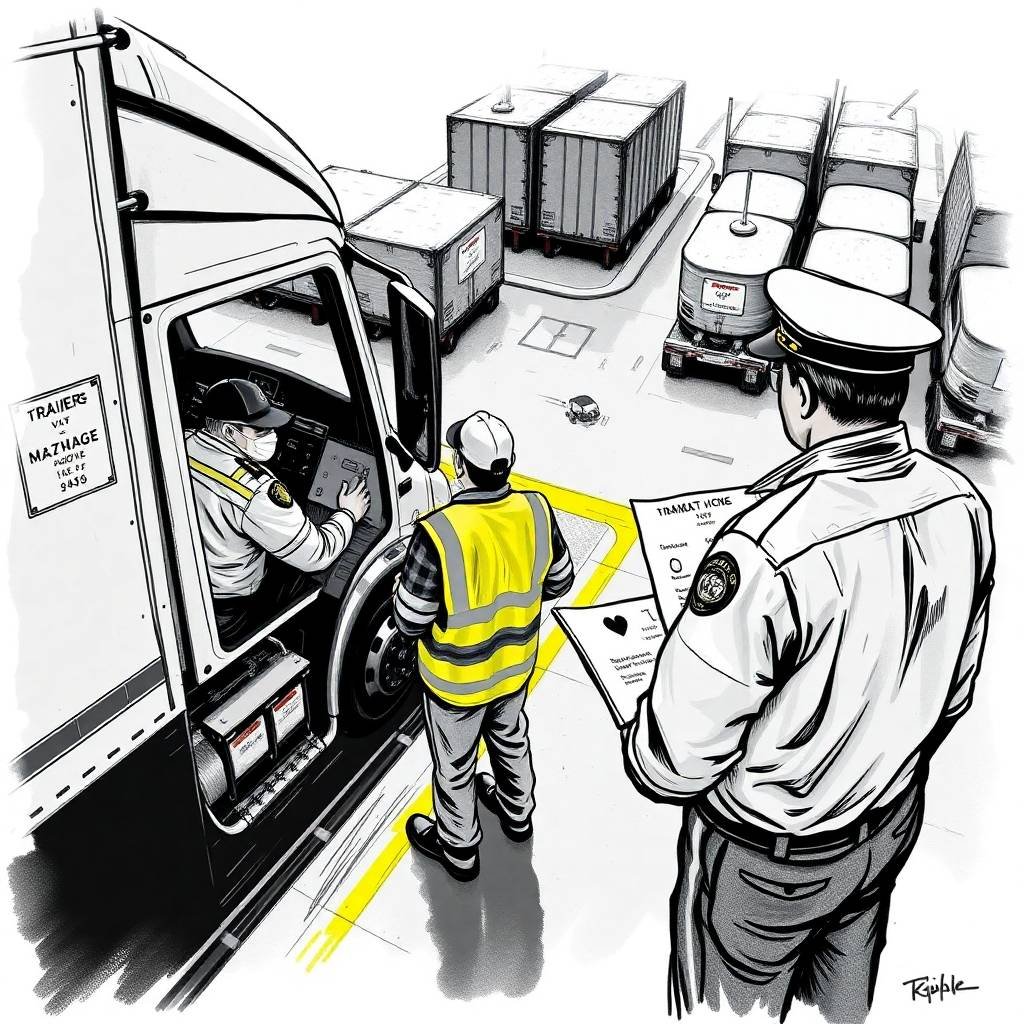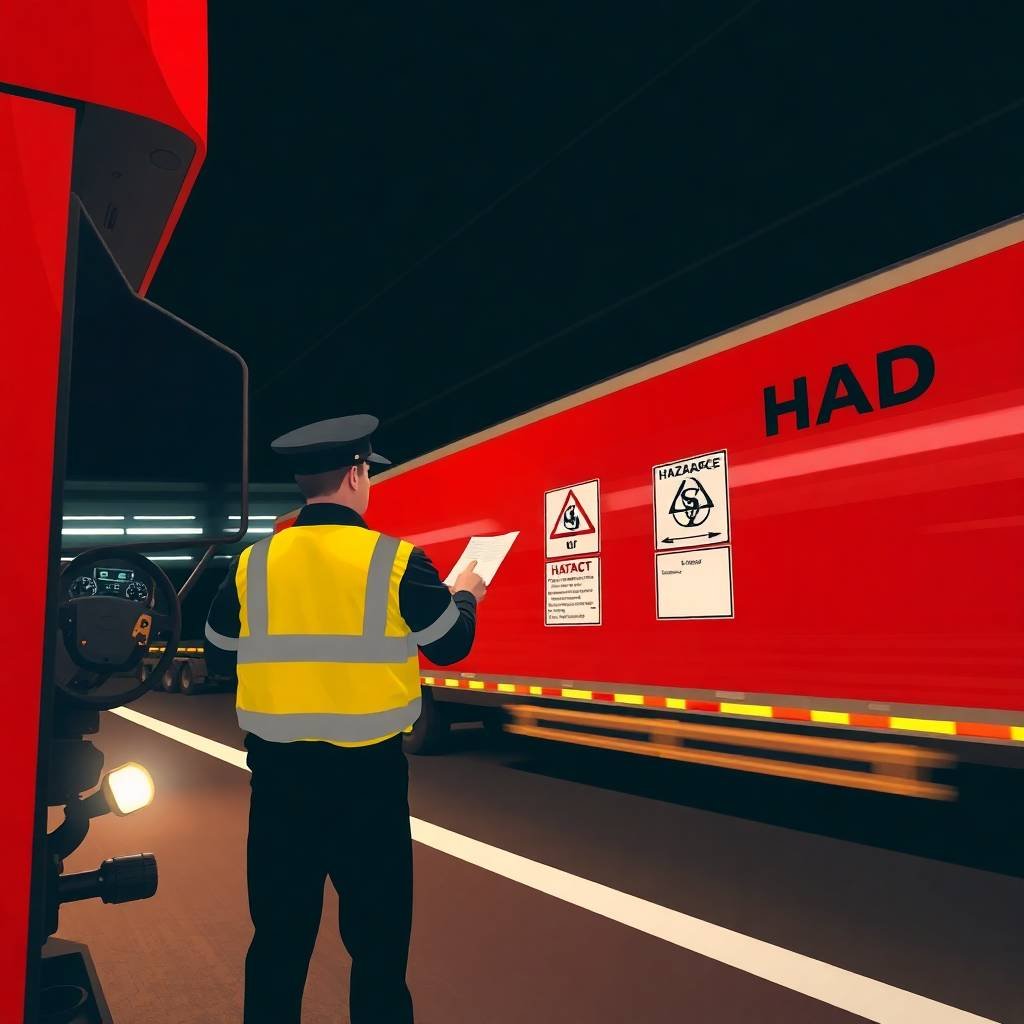1. Understanding Hazmat Registration Requirements FMCSA: What You Need to Know First
When transporting hazardous materials, complying with Hazmat Registration Requirements FMCSA isn’t optional — it’s essential. Failing to register correctly with the Federal Motor Carrier Safety Administration (FMCSA) can lead to costly penalties, failed audits, and even business shutdowns. Whether you’re an owner-operator or managing a larger fleet, understanding these requirements from the beginning sets the foundation for safety, legality, and operational success.
What Are Hazmat Registration Requirements FMCSA?
The Hazmat Registration Requirements FMCSA are federal regulations that mandate any carrier or shipper transporting certain quantities of hazardous materials to register annually with the U.S. Department of Transportation. This ensures proper tracking, oversight, and emergency preparedness.
You can find the official guidance directly on the FMCSA website or the U.S. Department of Transportation. These agencies outline the thresholds, materials, and classifications that trigger mandatory registration.
Who Must Register?
Carriers who transport placarded quantities of hazardous materials must comply with Hazmat Registration Requirements FMCSA. This applies to private fleets, for-hire carriers, and freight forwarders alike. If you’re unsure whether your operations qualify, scheduling a free compliance consultation can help determine your next steps.
Key Compliance Documents You Need
To meet Hazmat Registration Requirements FMCSA, you must maintain updated DQ files, training records, registration certificates, and shipping manifests. Our detailed post on Driver Qualification File Requirements explains how to manage these files effectively. Also, review common DQ File Violations to avoid audit red flags.
Don’t miss our DOT Compliance Checklist and tailored Owner-Operator Checklist for essential documentation.
Avoiding FMCSA Pitfalls
Many carriers make avoidable mistakes when trying to meet Hazmat Registration Requirements FMCSA. Our guide on FMCSA Compliance Mistakes breaks down how to correct them. Use our Correction Service to stay on track.
If you’re new to the industry, New Entrant Safety Audit Survival Tips will help you navigate your first year with confidence.
Support Services for Full Compliance
Ensuring compliance doesn’t have to be overwhelming. At Truckers Compliance Hub, we offer full-service support including DOT Audit Preparation, Drug and Alcohol Testing Management, CSA Intervention Thresholds, and IFTA/IRP/BOC-3 Support.
Explore resources like FMCSA Clearinghouse Compliance, Pre-Employment Drug Testing, and Random Testing Rules.
Looking to improve your company’s driver metrics? Check out Driver Safety Score Management.
Stay Informed and Prepared
You can browse our latest posts or dig deeper into FMCSA Compliance Help for Trucking Companies and Services for Owner-Operators.
Before proceeding, please review our Disclaimer and Terms of Service to fully understand your rights and responsibilities.
By thoroughly understanding and implementing Hazmat Registration Requirements FMCSA, your fleet or operation will be more resilient, audit-ready, and legally compliant. Ready to take action? Book your strategy session now.

2. Step 1: Gather and Organize Essential Documentation
When it comes to complying with Hazmat Registration Requirements FMCSA, the very first and most critical step is gathering and organizing the essential documentation. Documentation is the foundation of compliance, and failing to have your paperwork in order can lead to costly penalties, failed audits, and unnecessary operational disruptions. Before transporting any hazardous materials, make sure your documents are accurate, up to date, and accessible.
Understanding the Documentation You Need
To meet Hazmat Registration Requirements FMCSA, you must have several core documents in place. These include your DOT registration, hazmat training certificates, shipping manifests, emergency response information, and proof of insurance. More importantly, your Driver Qualification (DQ) Files must be complete and accurate. Incomplete or outdated files are one of the top FMCSA DQ File Violations that carriers face during audits.
Refer to our comprehensive DOT Compliance Checklist and Owner-Operator Checklist to ensure no required documents are overlooked.
Stay Compliant with Drug and Alcohol Testing Records
Another important part of the documentation process under Hazmat Registration Requirements FMCSA is drug and alcohol testing compliance. Your business must maintain complete records of pre-employment, random, and post-accident testing. Learn more about Pre-Employment Testing, Random Testing Requirements, and managing a Drug and Alcohol Program.
Our dedicated Drug and Alcohol Testing Management Service can help streamline this process while ensuring compliance.
Audit-Ready Organization and Storage
Properly organizing your documentation isn’t just about having the right papers—it’s about presenting them clearly during a DOT audit. We offer DOT Audit Preparation services to help you survive even the strictest inspections.
You should also review FMCSA Compliance Requirements for Trucking Companies to understand what inspectors expect and how to keep digital and physical records ready for review.
Helpful Tools and Resources
For help staying on track with Hazmat Registration Requirements FMCSA, visit the U.S. DOT or FMCSA. Our Compliance Hub Blog is updated regularly with resources like FMCSA Safety Measurement System SMS 2025 and FMCSA Clearinghouse Compliance.
We also offer corrective support for FMCSA violations and services like UCR Filing Deadlines, IFTA/IRP/BOC-3 Support, and CSA Threshold Management.
Explore FMCSA Compliance Help for Trucking Companies or Services for Owner Operators for full assistance.
Get Professional Help Today
Want to avoid costly mistakes with your Hazmat Registration Requirements FMCSA documentation? Schedule your free compliance consultation to speak directly with our experts.
Before using any service or resource, be sure to review our Disclaimer and Terms of Service.

3. Step 2: Conduct Regular Internal Compliance Audits
One of the most effective strategies for maintaining compliance with Hazmat Registration Requirements FMCSA is conducting regular internal compliance audits. These self-assessments help identify potential issues before they escalate into violations, DOT audits, or enforcement actions. A proactive approach empowers carriers to address discrepancies early and sustain a clean safety record.
Why Internal Audits Matter for Hazmat Compliance
Internal audits are essential in ensuring your fleet and administrative processes align with Hazmat Registration Requirements FMCSA. Routine reviews of your driver qualification files, drug and alcohol testing records, and vehicle inspection documentation help prevent violations. If you’re unsure where to begin, our DOT Compliance Checklist offers a step-by-step breakdown of what needs reviewing.
Additionally, internal audits ensure you’re prepared for FMCSA scrutiny at any time. Our guide to DOT Audit Preparation 2025 outlines what to expect and how to prepare effectively.
Identify and Correct Violations Before They Cost You
One of the most common causes of compliance failure is neglected documentation. Audits help uncover DQ file violations, improper hazmat handling procedures, or lapses in required drug testing. Through consistent reviews, you can avoid costly penalties and address issues with services such as How to Correct FMCSA Violations.
Understanding the impact of compliance scoring is equally vital. Our resource on the FMCSA Safety Measurement System SMS 2025 shows how internal audits directly influence your CSA scores.
Establish a Routine Audit Schedule
To align with Hazmat Registration Requirements FMCSA, create a routine schedule for your audits. Quarterly assessments are ideal for maintaining readiness. This should include checks on:
- Random DOT Drug Testing
- Driver Safety Score Management
- IFTA, IRP, and BOC-3 documentation
- UCR Filing Deadlines
New businesses can also benefit from our New Entrant Safety Audit Survival Tips, tailored specifically for first-time audits.
Get Professional Support with FMCSA Audits
Many carriers choose to partner with compliance experts to ensure internal audits align with Hazmat Registration Requirements FMCSA. We offer comprehensive audit preparation and drug and alcohol program management to streamline the process.
If you’re ready to take control of your compliance health, schedule a consultation today.
Stay Informed with Ongoing Resources
Stay up to date with new compliance challenges and FMCSA regulations by visiting our Compliance Hub Blog, which covers everything from FMCSA Clearinghouse Compliance to avoiding common FMCSA mistakes.
Don’t forget to consult official sources like FMCSA and the U.S. Department of Transportation for policy updates.
For deeper insight, explore our FMCSA Compliance Help for Trucking Companies and Compliance Services for Owner Operators.
Before using any services or implementing changes, we recommend reviewing our Disclaimer and Terms of Service.
Conducting regular internal audits not only ensures compliance with Hazmat Registration Requirements FMCSA, but also demonstrates your commitment to safety, responsibility, and operational excellence.

4. Step 3: Ensure All Employees Meet Hazmat Training Standards
When it comes to compliance with Hazmat Registration Requirements FMCSA, ensuring all employees meet training standards is not optional—it’s a legal requirement and a critical factor in maintaining safety and avoiding costly violations. From drivers to administrative staff, each team member involved in the transportation of hazardous materials must complete specialized training that aligns with FMCSA and Department of Transportation (DOT) regulations.
The Importance of Hazmat Training in FMCSA Compliance
Hazmat training is more than a box to check. It is a core requirement outlined by both FMCSA and the Department of Transportation to ensure that anyone handling or managing hazardous materials understands the risks and responsibilities involved. Under the Hazmat Registration Requirements FMCSA, untrained or undertrained personnel can lead to serious violations and safety issues.
Our DOT Compliance Checklist outlines the training components needed for different roles within your company, including general awareness, function-specific, safety, and security training.
Avoiding Common FMCSA Compliance Mistakes Through Training
Training gaps are one of the most common FMCSA compliance mistakes. They can lead to violations uncovered during DOT audits or impact your Safety Measurement System (SMS) scores. Ensuring your team is trained also reduces the risk of DQ file violations and keeps you aligned with the driver qualification file requirements.
Comprehensive hazmat training should also integrate well with drug and alcohol testing compliance, which is essential under Hazmat Registration Requirements FMCSA.
Customized Hazmat Training and Compliance Support
We understand that every fleet has unique needs. Our Drug and Alcohol Testing Management and Driver Safety Score Management services are designed to support full compliance. Whether you’re setting up new employee training or need to retrain after an audit, our team can help you stay current.
You can schedule a consultation with a compliance expert to evaluate your company’s training program and identify gaps in your Hazmat strategy.
Training for New Entrants and Ongoing Compliance
New to the industry? Our New Entrant Safety Audit Survival Tips provide guidance on how training plays a vital role in surviving initial audits. We also recommend periodic reviews of training records to ensure continuous alignment with Hazmat Registration Requirements FMCSA and evolving regulations.
Access tools like CSA Intervention Thresholds and UCR Filing Deadlines to strengthen your compliance strategy.
Stay Informed and Protected
Stay ahead of compliance updates by visiting our Compliance Hub Blog where you can read about topics like FMCSA Clearinghouse Compliance and Pre-Employment Drug Testing Requirements.
Learn more about our tailored compliance services for fleets and owner-operators:
- FMCSA Compliance Help for Trucking Companies
- FMCSA Compliance Services for Owner Operators
- FMCSA Compliance Services for Owner Operators – Part 2
And remember to review our Disclaimer and Terms of Service to understand the use of our content and services.
Ensuring all employees meet hazmat training standards is not only required under Hazmat Registration Requirements FMCSA, but it’s a proactive investment in safety, performance, and long-term compliance success.

5. Step 4: Leverage Technology to Track and Maintain Registration Compliance
Staying compliant with Hazmat Registration Requirements FMCSA demands more than paperwork and manual tracking—it requires technology-driven precision. As regulations evolve, motor carriers must use digital tools to manage compliance efficiently, avoid penalties, and uphold safety standards. Leveraging compliance technology gives fleets the ability to centralize, automate, and stay current with essential documentation and procedures.
Why Technology is Essential for FMCSA Compliance
The Federal Motor Carrier Safety Administration (FMCSA) outlines strict procedures for tracking hazardous materials. Using modern systems allows you to manage everything from driver qualification files to DOT drug and alcohol testing programs, ensuring every box is checked under Hazmat Registration Requirements FMCSA.
Digitally tracking registration deadlines, audit preparation status, and CSA intervention thresholds significantly reduces the likelihood of oversight. For instance, managing UCR filings or IFTA/IRP/BOC-3 documentation becomes seamless when you automate renewal alerts and documentation uploads.
Streamlining Compliance Tasks with Technology
Smart technology solutions enable you to manage recurring responsibilities like random drug testing requirements, pre-employment drug testing, and FMCSA Clearinghouse compliance. These tools help ensure all compliance steps are completed and logged without human error—crucial to passing a DOT audit.
Whether you’re a fleet operator or an owner-operator, tools like our DOT Compliance Checklist for Owner Operators simplify the complexity of staying in line with Hazmat Registration Requirements FMCSA.
Avoid Costly Errors and Improve Accountability
Noncompliance can result from avoidable oversights. Our post on FMCSA compliance mistakes shows how errors like expired registrations or missed testing deadlines impact operations. Digital tools help prevent these issues by automating updates and notifying you in advance.
Pair your tech solutions with professional services like Driver Safety Score Management and Drug and Alcohol Testing Management to enhance your compliance ecosystem.
To review your current setup or implement a tailored digital strategy, schedule a consultation today with our compliance experts.
Digital Compliance Support for New and Established Carriers
New carriers can prepare for the New Entrant Safety Audit by digitizing their records early. Established carriers benefit from annual reviews and upgrades through our services like DOT Audit Preparation and How to Correct FMCSA Violations.
Explore our FMCSA Compliance Help for Trucking Companies and FMCSA Compliance Services for Owner Operators to discover which solutions fit your needs.
Stay Updated and Protected
For compliance updates, visit Truckers Compliance Hub, where we cover the latest from DOT, the FMCSA, and more. Explore key posts like DQ File Violations and Drug and Alcohol Testing Compliance to stay informed.
By embracing technology, you can align fully with Hazmat Registration Requirements FMCSA, reduce risks, and improve operational efficiency. Don’t forget to review our Disclaimer and Terms of Service for complete details about using our resources.
Let technology work for you. Automate compliance and gain peace of mind knowing you’re aligned with every aspect of Hazmat Registration Requirements FMCSA.

Who is required to comply with Hazmat Registration Requirements FMCSA?

Any company transporting quantities of hazardous materials that require placarding under federal regulations must comply with Hazmat Registration Requirements FMCSA. This includes carriers, shippers, and brokers handling hazardous loads. If you’re unsure about your specific obligations, DOT Audit Preparation services can guide you through the steps to determine if registration is required and ensure you’re fully prepared for audits.
What documents should I maintain to stay compliant with Hazmat Registration Requirements FMCSA?

To remain in compliance with Hazmat Registration Requirements FMCSA, you need to maintain accurate shipping papers, registration certificates, driver training records, and safety documentation. Properly organized records can significantly reduce the risk of audit penalties. DQ File Setup and Monitoring can help ensure your documentation meets FMCSA standards.
How does driver training relate to Hazmat Registration Requirements FMCSA compliance?

FMCSA requires that all drivers involved in transporting hazardous materials complete specific hazmat training. This includes general awareness, function-specific, safety, and security training. Staying compliant with Hazmat Registration Requirements FMCSA means ensuring drivers are properly trained and that training is well documented. You can streamline compliance through professional Drug and Alcohol Testing Management, which often integrates hazmat training requirements.
Can technology help me stay compliant with Hazmat Registration Requirements FMCSA?

Yes, digital solutions can play a significant role in managing compliance. Automated tools can track renewal dates, document storage, and flag non-compliance risks associated with Hazmat Registration Requirements FMCSA. Services like UCR Filing Assistance provide digital filing and tracking, helping carriers stay up to date and audit-ready.
What’s the most common mistake carriers make regarding Hazmat Registration Requirements FMCSA?

One of the most frequent errors is failing to renew registration annually or incorrectly assuming that general motor carrier registration covers hazardous materials. This can result in costly penalties and failed audits. To avoid this, carriers often turn to IFTA, IRP & BOC-3 Support, which ensures all required filings, including those related to Hazmat Registration Requirements FMCSA, are properly handled.
Igor Iturriaga is a transportation compliance expert and founder of Dynamic 305 Miami LLC. He helps owner-operators and fleets stay FMCSA-compliant and audit-ready. https://www.linkedin.com/in/igor-iturriaga-64503217/
